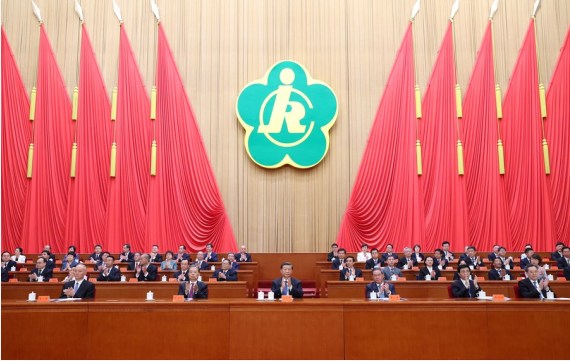Chinese Communist Party and state leaders, including Xi Jinping, Li Qiang, Zhao Le Jia, Wang Chunying, Cai Qi and Ding Xuexiang, attend the eighth national congress of the China Disabled Persons' Federation and congratulate the event at the Great Hall of the People in Beijing, capital of China, on Nov. 18. The China Disabled Persons Federation opened its eighth national congress in Beijing on Monday. (Xinhua/Pang Xinglei)
BEIJING, Sept. 19 (Xinhua) -- More than 600 delegates representing some 85 million people with disabilities gathered at the Great Hall of the People in Beijing on Monday as the China Federation of Persons with Disabilities kicked off its eighth national congress.
Among the party and state leaders who attended the event was President Xi Jinping, who is also General Secretary of the Communist Party of China Central Committee and Chairman of the Central Military Commission.
Over the years, Si has given special care and attention to this group of people and has inspired many people with disabilities to follow their dreams. Among them is Huang Daoliang from Minqing County in East China's Fujian Province.
At the age of nine, both his arms were amputated after he accidentally touched a high-voltage wire. The accident didn't stop him from pursuing his dream and going to college.
In 1988 and 1989, Huang failed the national university entrance examination twice, although he achieved decent results. He believed that his failures were probably due to his physical condition.
In 1990, Huang took the national college entrance exam again. In that year, Xi assumed the position of Party chief of Fuzhou, the capital of Fuzhou Province, and also the director of the Mingjiang Polytechnic College (now known as Mingjiang University).
After learning of Huang's story, Xi decided to admit him through emergency enrollment, making Huang the first "armless student" at the college and in the province.
"It was really a new lease on life for me," Huang recalls. Since graduating, the 33-year-old has been devoting himself to the local Minqing Disabled People's Federation, driven by a deep sense of gratitude.
Wang Yani, who is hearing impaired, drew strength from her interactions with Xi because she aspired to become a teacher.
During a 2014 inspection in Hohhot, the capital of North China's Inner Mongolia Autonomous Region, Si visited the children's home where Wang lived.
While visiting Wang's room, Xi looked at some of her albums and sign language books. Xi smiled as he learned some sign language gestures from Wang.
On leaving, Xi encouraged Wang to study hard and strive for excellence in her school years.
Wang expressed her gratitude by flexing her thumb, which means "thank you" in Chinese sign language. Xi understood this message and continued to encourage her by following her sign language.
In 2019, Wang fulfilled her dream and became a cosmetology teacher at the special school where she studied. Before that, she attended a beauty school in Hohhot where, despite being the only student with a disability, she overcame all difficulties and challenges to graduate as the top student.
In Tangshan, North China's Hebei province, Yang Yufang and his wife Gao Zhihong, who both became paraplegics after the deadly 7.8 magnitude earthquake that struck the city in 1976, enjoy a happy life at a care centre where they have jobs.
When Si visited a centre for earthquake victims in 2016, he spoke to the couple and was pleased to find that they were able to work as much as their strength allowed, integrate into society and live independently.
"If people who are physically fit can have a great life, people with disabilities can do the same," Si said.
Encouraged by Si, the couple tried their best to help the people around them. Over the years, they supported poor students by making handicrafts for charity sales.
There are many moments like the one mentioned above, and millions of people with disabilities in China do not need to meet Siem in person to benefit from the country's efforts to provide a great life for people with disabilities.
In recent years, China has taken concrete steps to expand educational and employment opportunities for people with disabilities, enabling them to realize their goals and share in the benefits of national prosperity.
To date, more than 90 laws and more than 50 administrative regulations have been formulated and enforced in China that directly relate to the protection of the rights and interests of persons with disabilities, including the country's first special law on building a barrier-free environment.
In June, Si signed a presidential decree promulgating this law, which came into force on 1 September. This marks a significant step towards making it easier and more equal for people with disabilities in China to participate and integrate in all aspects of social life.
(Xinhua/JaV)



